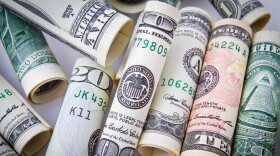Dr. Robert Lefkowitz has won the Nobel Prize in chemistry. He’s a principal investigator and faculty member at the Howard Hughes Medical Institute at Duke University Medical Center. Lefkowitz shares the award with Brian Kobilka from Stanford University. Together, the two men work in the field of G-protein coupled cell receptors. Yesterday was a big day on Duke’s campus.
Dave DeWitt: Robert Lefkowitz was planning to spend a normal day at the office. Meet with some researchers in his lab. Maybe step out to get a haircut. But an early morning phone call from Sweden changed his plans.
Robert Lefkowitz: Well, the first thing that goes through my mind is that they are not calling to find out the weather here in Durham. This must be something important.
It was. Lefkowitz had won the Nobel Prize in chemistry, becoming the first full-time faculty member at Duke to be so honored. The last winner in the Triangle was Oliver Smithies at UNC-Chapel Hill five years ago, who won a Nobel Prize in medicine. As much as it was Lefkowitz’s day, it was also Duke’s. President Richard Brodhead remembers that when he arrived in 2004, he was quickly alerted to the star scientist by an administrator in the medical school.
Richard Brodhead: The first person currently at Duke most likely to win a Nobel Prize is Bob Lefkowitz. And I said why will that be, and he said well, because he made this discovery that is fundamental to the way a huge category of drug therapies work that we all take for granted as the frontier of medicine.
That frontier of medicine is called G-protein cell receptors, molecules that are a part of every cell in the body. Lefkowitz says it’s like a lock and a key. The keys are things like adrenaline and dopamine that want to get inside a cell and make it do something. The locks are the G-protein coupled receptors. When Lefkowitz began studying these cell receptors, scientists weren’t even sure they existed. Today, as many as half of all drugs on the market use them to deliver medicine to the cells. Lefkowitz came to Duke to do this research in 1973. His starting salary was $24,000 a year.
Lefkowitz: Duke was not the powerhouse in 1973 that we are today. And it never occurred to me I’d be here for my entire career. But, you know, it worked.
Over that almost 40-year career, Lefkowitz has written hundreds of scholarly articles and mentored more than 200 young scientists through his lab. One of them was Brian Kobilka. After he left Duke, Kobilka started his own lab at Stanford and continued to collaborate with Lefkowitz. Yesterday, the two men, mentor and mentee, spoke on the phone after they learned that they were sharing this year’s Nobel Prize for chemistry.
Lefkowitz: And so I said, you know Brian, there’s no way this would have happened for me if it wasn’t for your work. And he basically responded that obviously the opposite was true, as well.
Lefkowitz is known for creating a powerhouse lab at Duke, one that churned out not only world-class scientists, but created an atmosphere that celebrated the joy of scientific discovery. Ralph Snyderman is Lefkowitz’s best friend and used to have the lab next to his. He recalls a time when his office was just down the hall from the “Lefko Lab.”
Ralph Snyderman: I was amazed by the constant din of people yelling and screaming and celebrating about this, that and the other thing. It was a culture of excitement, of discovery, and nurturing people’s intellect that I’d never seen before. So Bob, if there was a Nobel Prize for mentoring, he would win it.
As Lefkowitz moves into that rarified air of “Nobel Winner” he vows it will not change that devotion to mentoring or to research.
Lefkowitz: If people know I won the Noble Prize, great. If they don’t, I ain’t gonna tell ‘em. I really hope it changes me as little as possible. Frankly, I can’t imagine it will.
Lefkowitz and Kobilka will share the $1.2 million that comes with their Noble Prize. They will officially receive the award at a ceremony in Stockholm in December.







